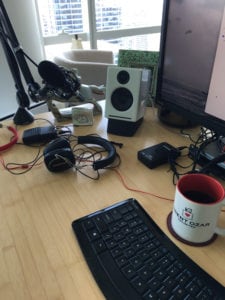I hate networking.
Even just typing the word makes me cringe because it makes me think walking up to a complete stranger and striking up a conversation. I hate approaching strangers. Ever since the time with the van and the candy, I… I’d rather not talk about it.
Networking is a time suck that doesn’t scale. Whenever you want to make new connections, you have to go to a location, be mentally present, and you can’t be doing anything else. It’s an active task, not a passive task.
You don’t have time for more active tasks because your day job is already overworking you. You don’t have free work time, so any time you carve out for networking is going to mean less personal time for you, the ones you love, and your health.
And let’s be honest – most of us aren’t really people people. Old-school networking – going to “businessing” meetings and rubbing elbows with people in suits – drains the bejeezus out of me. I’d rather be doing just about anything else.
That’s why you should be coding and blogging.

You don’t need amazing people skills, and you don’t have to be photogenic, either. Blogging and coding are about the quality of what comes out of your keyboard, not your mouth. You can take your time, polish your craft, and gradually up your game.
Blogging and coding are asynchronous. You can don’t have to meet strangers at some arbitrary date/time/place. You can make the schedule whatever works for you – after the kids go to bed, before you go to work, or in the middle of the night when you’ve got a great idea.
These tasks prove your expertise publicly. Blogs and Github projects are like resumes: a permanent written record of what you were working on, when.
Other people will do your networking while you sleep. When you write good stuff, other people will pass it on to their friends. People with a huge network will help snowball your readership faster.
Coding and blogging are passive networking tasks. Sure, the writing itself is an active task – you have to focus to put good stuff out there – but once it’s out, it stays out for years, slowly gathering readers. Good work snowballs, paying itself forward.


11 Comments. Leave new
Also, if you live in a small town and have a tiny travel budget, then networking opportunities are fewer any way.
Michael – very true! And plus, if you do networking online instead, you’re more likely to get a remote work job, meaning you can stay in your small town and enjoy a great cost of living benefit. (That’s a tougher long-term game, but doable.)
Hey Brent,
The passive work is certainly..easier? More natural? I agree with the benefits, and I think you point out some of the challenges of networking. I tell people it is a leap of faith – will you meet someone interesting, someone who will send you business, etc? No way to know. But I don’t know that its good to not do some. In part to build people skills that always matter and tend to get rusty if we hide in the coding cave all year long, in part because not everyone has a big online presence, or reads those that do, and sometimes magic happens. I’m a fan of both “hoping for magic” at more social networking events and targeted “i want to talk/learn about this” networking – call it purposeful networking.
Networking tires me out too, though less than it used to. I still make time to recharge afterwards. I know that pushing myself to do it has helped me.
Andy
Andy – thanks! To some extent, your day-to-day work in IT should involve in-person networking. I tell folks that everybody around you is your first set of future customers: you need to treat them like customers today, be good to them, make sure they know they’re valued, and that pays off over time. You can hone those skills every day – but granted, that’s a very different mindset than a lot of us have in IT.
Brent, we’re in agreement on the customer mindset!
Andy, i must side with Brent here. Networking as an activity on its own is very stressful for me, i have tried it and it rarely works. To talk to someone totally new i’d like a facilitated environment – that is partly why am a huge fan of sqlcruise, small groups of people, you are introduced to one another and you have things to talk of. Just walking up to someone for no reason and trying to pick up a conversation – 1 is stressful 2 I dont like rudeness,i can handle polite refusal to a conversation but many people are downright rude and don’t mince words that they dont entertain a conversation.(has happened at the summit even with people i know). Brent is right on with the numbers game, just got rid of a few hundred business cards gathered at the summit over a decade, i am not sure i remember most of those people, and they sure are not likely to remember me. I really don’t see the point of having hundreds of people as linked in contacts or worse still, facebook friends when you know next to nothing about them. It does not help even with finding work – the last time i was looking most of the folks who helped me were folks i knew seriously well, not from the ‘relatively unknown pool’. I know many people at the summit now as a result of community work and going there repeatedly, so it is not longer as stressful as it used to be, thank goodness. Will keep that circle and grow it with valuable people , not just anyone. And, always enjoy seeing you at the Barnes and Noble next door at Seattle, on the last day, hope you will make it in this time :))
BTW, did not sign off, this is Mala 🙂
I knew who it was Mala:-) Book stores are safe place for us introverts!
Networking is stressful for many of us and it’s easy to find reasons (good and bad) to not do it. That’s comfortable, but is it good? Now I know its not all or none, but for many it becomes that. One trick I use is setting a goal of meeting 3 new people each day of an event, figuring I’ll spend from 1 to 10 minutes with each one. Once I hit my goal I can go back to being an introvert and hang out with friends, back in my comfort zone. Do all of those new contacts end up being meaningful? I won’t know until much later. That’s the hard part of networking, you don’t know when you’re doing it if it matters. 3 people per day adds up!
How about you and I do some networking together in Seattle? We can talk about what works and what doesn’t, and have some fun too?
Regards,
Andy
Would absolutely love that Andy! Glad you’re coming.
I have to take the opposite position on what should be done, at least for myself. I am very much a people person and blogging feels like a chore for me, so in person networking works a lot better.
You also can make traditional networking scale better by focusing on how you and each person you meet can extend each other’s networks further than just yourself. If you make sure that you are memorable (for neutral or positive reasons) and one of the things someone remembers about you is what you do and what kind of people you know, then you can be someone the other person will come to or direct their network to.
Mike – sure, if you don’t like doing one thing, then something else can work better for you. Totally agreed and understood – salespeople are a classic example of that. They’re just better-suited for in-person work because they’re great at reading people and adapt.
However, it still doesn’t scale. Take any typical blog, and you can easily get 50-100 hits per day with minimal to no effort. In-person networking doesn’t scale like that, let alone to thousands of impressions per day.